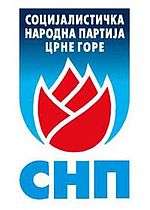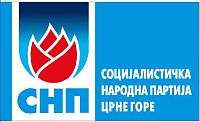Socialist People's Party of Montenegro
Socialist People's Party Socijalistička narodna partija (SNP) Социјалистичка народна партија (СНП) | |
|---|---|
 | |
| Abbreviation | SNP |
| Leader | Vladimir Joković |
| Founder | Momir Bulatović |
| Founded | 1997 |
| Split from | Democratic Party of Socialists |
| Headquarters | Podgorica |
| Ideology |
Current: Social democracy[1][2] Social conservatism[1] Pro-Europeanism Historical: Democratic socialism Serbian–Montenegrin unionism |
| Political position |
Fiscal: Centre-left Social: Centre-right |
| Colours | blue, white, red |
| Parliament |
2 / 81 |
| Local Parliaments |
59 / 786 |
| Party flag | |
 | |
| Website | |
| www.snp.co.me | |
The Socialist People's Party of Montenegro (Montenegrin: Социјалистичка народна партија Црне Горе / Socijalistička narodna partija Crne Gore) is a socially conservative[1] and social-democratic[1][2] opposition political party in Montenegro. It is part of the Key Coalition, an opposition political alliance in Montenegro. It has 2 (in the Parliament of Montenegro) of 3 MPs which it won in the 2016 parliamentary election. The party is pro-European Union and anti-NATO.
History
Origins
In the late 1990s a rift inside the ruling Democratic Party of Socialists of Montenegro came out. On the Montenegrin presidential election, 1997, aside then's President of the Republic and the Party Momir Bulatović, the Premier of Montenegro and party's vice-president Milo Đukanović ran too, leading a reforming wing opposing mainstream DPS CG's political attitudes regarding support of Serbian president Slobodan Milošević. The ruling parties of the Republic of Serbia (the constitutive partner of the Federal Republic of Yugoslavia like the Republic of Montenegro), SPS and SRS, have soundly and firmly stood on Momir's side, while the opposition in Serbia (SPO, DS, DSS and GS) gave their support in Milo. It is so that the Democratic Party of Socialists — Momir Bulatović had officially seceded from the other branch of the DPS CG, but Momir's supports had only retained majority in 5 municipalities of Montenegro, while the other 16 in which DPS reigned voiced their support of Milo.
Momir presented in the political campaign that his main goal was the preservation of FRY and the maintaining of the present political status in Montenegro. In the first round on 5 October 1997 Momir Bulatović won receiving most votes, 147,615 or 47.45%, but lost to opposing Milo the second round on 19 October 1997 when he won 169,257 or only 49.2%. Momir refused to recognize the results, calling them unrealistic and forged — considering that every single of the other candidates that ran in the first circle voiced their support in Momir in the second. One of the main controversial moments, as criticized by OEBS, is that Milo as Premier, managed to seize control of the Montenegrin national media (e.g. TV CG). On the other side, the Serbian national media had also been unbalanced, promoting Momir. The other unbalancing issue is that Milo, as Premier, was in a much stronger position to further his personal goals, controlling the government (the President had very little authority in effect) and had seized control over most of DPS' local authorities, while DPS — Momir Bulatović got only 5 of total DPS' 21. On the other hand, Momir enjoyed the support of Serbia and the Federal Yugoslav government itself. With the huge clashes between Momir and Milo, the election respected minimal democratic standards. However, with eventual loss at the election, the rift between the two wings was final.
First Period
By 2000, Milošević began to lose its ground in Serbia, and it became apparent that he no longer had support either within the international community or his own country. However, Momir Bulatović was still a close ally of Milošević, and that fact led to a split within the SNP on whether to stay loyal to Milošević or to become a party with a more democratic image. In 2001 the pro-European and democratic wing led by Predrag Bulatović prevailed and he became SNP's president. The party continued to be a proponent of the union with Serbia, while the old-style pro-Milosevic faction of politicians formed the People's Socialist Party (Народна социјалистичка странка, Narodna socijalistička stranka) under Momir Bulatović.
Second Period
As some ethnic Serb parties took advantage of the SNP's new orientation and attracted some voters, SNP became to be the strongest opposition party in Montenegro. It was the leader of the Movement for European Union of Serbia and Montenegro, which eventually failed to preserve the union with Serbia. SNP avoided to explicitly state its rejection of the Montenegrin independence referendum results, but it refused to attend the country's inauguration ceremonies. Other pro-union opposition parties openly refused to recognize the results.
On the first parliamentary elections in independent Montenengro, SNP saw the largest downfall of the number of its voters since the founding of the party. The coalition it had led in 2002 elections fell from 30 to 11 seats in the Montenegrin parliament. SNP lost its status of leader of Montenegrin opposition in favour of Serbian List led by Serbian People's Party of Montenegro (12 seats) and Movement for Changes (11 seats). This resulted in resignation of party's leader Predrag Bulatović, as well as three vice-presidents.
Third Period
On 27 December 2006, Srđan Milić was announced new party president, after gaining the majority of General Party Congress votes, and beating the other two candidates, Dragiša Pešić and Borislav Globarević, representing the victory of the excessively pro-European Unionist program. SNP CG has adopted a strongly civic Social Democrat political course and broke off the traditional coalition with the People's Party and the Democratic Serb Party.
In the negotiations for the new Montenegrin Constitution, SNP has forged a united political alliance of practically the entire Opposition with the Movement for Changes, both of its old partners the People's Party and Democratic Serb Party, the members of the Serb List alliance, the Bosniak Party and the ethnic Albanian Democratic League in Montenegro and Albanian Alternative with a united platform, preparing to boycott the referendum. However, NS, DSS, DSCG and SL retreated from negotiations with the opposition. On the other hand, PzP, BS and AA accepted independently from the alliance terms of the ruling coalition and are ready to give the required super-majority to adopt the constitution. SNP has submitted 33 amendments and still does not include the option to support the constitution as well, under the condition that it's amendments — previously included in the Opposition's demands — are adopted.
The reforms of Srđan Milić worked well for SNP, as on 2009 Montenegrin parliamentary election it won 16 seats in Parliament of Montenegro, becoming once again the biggest sole opposition party.
Before the 2012 parliamentary election right-wing faction of the party led by their former president Predrag Bulatović left the party and join Democratic Front alliance. At election party ran independently and won only 11.06% of the votes, and 9 seats.
In February 2015, party faction led by Aleksa Bečić split from the SNP due to disagreements with party leader Milić, having decided to form a new political party, Democratic Montenegro.[3]
In September 2016, SNP decided to enter the Key Coalition with DEMOS and URA in order to participate at the forthcoming parliamentary election.[4] Coalition was third ranked electoral list with 11.05% of the votes and 9 seats, out of which SNP won only 3.
Fourth Period
After party president Srđan Milić resignation after 11 years of leading party for a catastrophically poor results at 2016 parliamentary elections. Vladimir Joković, supported by party faction led by former president of party parliamentary club Aleksandar Damjanović and current mayor of Berane Dragoslav Šćekić, was surprisingly elected President of the party at party General Congress held on 13 August 2017, in front of favored Snežana Jonica, supported by fraction close to former party leader Milić.[5]
Parliamentary elections
| Year | Popular vote | % of popular vote | Overall seats won | Seat change | Coalition | Government | Leader |
|---|---|---|---|---|---|---|---|
| 1997 | Split from Democratic Party of Socialists | 18 / 75 |
— | opposition | Momir Bulatović | ||
| 1998 | 123,957 | 35.62% | 29 / 75 |
— | opposition | Momir Bulatović | |
| 2001 | 148,513 | 40.56% | 21 / 75 |
ZZP | opposition | Predrag Bulatović | |
| 2002 | 133,894 | 38.4% | 19 / 75 |
ZZP | opposition | Predrag Bulatović | |
| 2006 | 47,683 | 14.07% | 8 / 81 |
NS-DSS | opposition | Predrag Bulatović | |
| 2009 | 54,547 | 16.8% | 16 / 81 |
— | opposition | Srđan Milić | |
| 2012 | 40,131 | 11.06% | 9 / 81 |
— | opposition | Srđan Milić | |
| 2016 | 42,295 | 11.05% | 3 / 81 |
Ključ | opposition | Srđan Milić | |
Presidential elections
| Election year | Candidate | # | 1st round votes | % | # | 2nd round votes | % | Note |
|---|---|---|---|---|---|---|---|---|
| 1997 | Momir Bulatović | 1st | 147,610 | 47.44% | 2nd | 169,257 | 49.20 | |
| 2008 | Srđan Milić | 4th | 39,316 | 11.92% | N/A | — | — | |
| 2013 | Miodrag Lekić | 2nd | 161,940 | 51.21% | N/A | — | — | Support |
| 2018 | Mladen Bojanić | 2nd | 111,711 | 33.40% | N/A | — | — | Support |
Positions held
Major positions held by Socialist People's Party of Montenegro members:
| Prime Minister of the Federal Republic of Yugoslavia | Years |
|---|---|
| Momir Bulatović | 1998–2000 |
| Zoran Žižić | 2000–2001 |
| Dragiša Pešić | 2001–2003 |
References
- 1 2 3 4 Nordsieck, Wolfram (2016). "Montenegro". Parties and Elections in Europe. Retrieved 4 July 2018.
- 1 2 Hans Slomp (2011). Europe, A Political Profile: An American Companion to European Politics: An American Companion to European Politics. ABC-CLIO. p. 592. ISBN 978-0-313-39182-8. Retrieved 4 July 2018.
- ↑ Aleksa Bečić napušta SNP: Ne mogu sa Milićem i Jonicom, Vijesti, 1. February 2015
- ↑ http://www.vijesti.me/vijesti/lekic-nosilac-liste-koalicije-kljuc-902940
- ↑ Joković novi predsjednik SNP-a, Vijesti, 13. August 2017